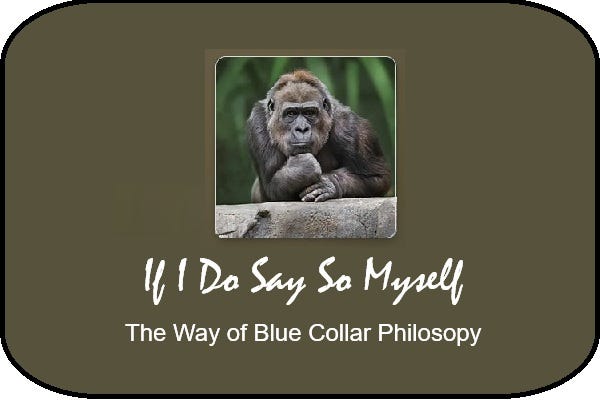Social Philosophy and the Art of Boatbuilding...
WELCOME TO THE WAY OF BLUE-COLLAR PHILOSOPHY... WHERE THOUGHT AND REFLECTION BREAK FREE OF THE ACADEMIC IVORY TOWER
Preface: Welcome to this series of personal reflections on boatbuilding and its connection to the world in which we live. I want to warn you up front that what you read in this particular series of my writings may border on being intellectual and literary self-indulgence. Which, by the way, is why I’ve titled this publication “If I Do Say So Myself”. However, if you are yourself inclined to ruminate on topics like those which appear here, I believe you may find this space, at least, interesting and entertaining, if not comfortable. (Candidly, comfort is over-rated.) And if, as well, you happen to find the conversation intellectually stimulating … well, for me, that is frosting on the cake. With that understood, please feel free to graze and read and, as the mood moves you, join the conversation. Your comments and criticisms are always welcome. Fair winds and safe harbors! — Phil Friedman
With a nod to Robert Pirsig
Most of us were, at one time or another, influenced by something we read or someone we met — occasionally so deeply that the trajectory of our life was radically altered. That happened to me when I first read “Zen and the Art of Motorcycle Maintenance” by Robert Pirsig.
I was, at the time, working on a doctoral thesis, supported by a Canada Council post-graduate fellowship. I had completed my doctoral qualifying exams and had already been teaching philosophy and logic at university for a few years. Truth be told, I was living the relatively comfortable, laid-back existence of a student-pauper. I was, nevertheless, haunted by an uneasiness — or perhaps more accurately, an existential angst — that felt akin to sex without climax.
I began to notice that a significant number of “professional” philosophers of my acquaintance were pursuing “hobbies” outside their academic sphere of endeavor, things like building houses and boats, hobby farming, brewing beer and making wine, flying small planes, and racing go-karts and motorcycles. So intent were they on pursuing these hands-on avocations, they often relegated their academic efforts to second-class status.
When Pirsig published his book — I use the term ‘book’ loosely — he was, like me, an aging philosophy graduate student, more or less, in limbo. Which was, I suppose, one reason his work drew my attention. At the time, he did not appear to me to be a very good philosopher. Plus, it was evident he didn’t know much about motorcycle mechanics. He apparently could fill the gas tank and, maybe, change oil and spark plugs, but I doubted (and still do) that he possessed the skill or experience even just to gap those plugs properly. Yet, buried in his rambling hodgepodge of observations and ideas, which was nominally about “value in the world” there was, IMO, an existential insight of truly singular significance.
It’s through manual labor that we achieve authentic connection to our existential reality and imbue the world in which we live with value.
As I have come over the years to understand this with more clarity, my respect for Robert Pirsig’s insight has grown. Pirsig had the audacity to suggest that working with your hands in the creation and maintenance of the artifacts we use in our day-to-day lives imbues the world around us with meaning and value — ever so much more than do abstract thought and study. In other words, it’s the “blue collar” guys among us, the crafts and trades people — and their fellow-travelers, the artists, musicians, architects, engineers and other creators like boatbuilders — who make life worth living, not those who toil away endless hours, days, and even years cogitating on its meaning.
When Ratty says in Wind In the Willows, (Kenneth Grahame’s children’s parable), “…there is nothing — absolutely nothing, half so worth doing as — simply messing around in boats….”, he makes a truly profound statement. Not just about boats. But about the fabric of our lives and our search for value and meaning in the world. And what he tells us is something no professional academic will ever admit, namely, that doing is ever so much more fruitful than thinking and talking.
Which is not to say that intellectual reflection is completely without value. After all, who am I to argue with Socrates when he tells us that the unexamined life is not worth living? I’m just moved to add the corollary that the over-examined life is hollow.
As in so many things, balance and authenticity are ultimately goals of the first order. A lot of doing, seasoned with a bit of reflection — not the other way around. It’s a mantra I’ve held close ever since I first read Pirsig’s work and left academia for boatbuilding.
However, notwithstanding 30-plus years in the recreational marine sector, I haven’t been able to completely stamp out my residual instinct for writing and philosophy. So, in this particular Substack space, I propose to use the discussion of boatbuilding (and various other “blue collar” activities) as a springboard to reflections about life and the world around us. And if you are so inclined, you are welcome to join the conversation.
— Phil Friedman
Copyright © 2024 by Phil Friedman — All Rights Reserved





I write poetry I live in a nursing home I am bedridden I don't walk but my mind still works fine I am 73 in a singer abd a poet I really an not good at physical or mechanical things but I really know how to use words to express emotions feelings and my thoughts on certain things is that not worth something too? I went to college I finished all but 30 hours I was a music major a voice major I also had a year and a half of marketing at ivy tech community College I also played the piano for years I sang as a, cantor and soloist at two catholic churches for three years and was in quite a few historical society shows I feel I gave people pleasure through my music and later through my poetry is that not worth something too BTW I also read zen years ago even studied it in a class